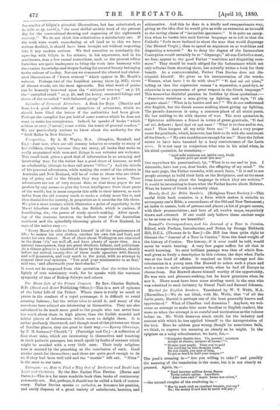Prospecting. By A. H. Wayte, M.A. (Simpkin, Marshall, and Co.)—Just
now, when our old country behaves so cruelly to many of her children, simply because they are many, all books that make us really acquainted with men and things in our colonies are welcome. This small book gives a good deal of information in an amusing and interesting way, for the writer has a good share of humour, as well as scholarship, (though be does call arums "Mies.") And the details of his personal adventures, while making the round of the colonies in Australia and New Zealand, will be of value to those who are think- ing of going and to the friends they may leave at home. These adventures are not of very recent date, so that these pages do not profess by any means to give the latest intelligence from those parts of the world ; but in some respects this adds to their interest, as each influx from the old country tends to make a colony more like it, and thus diminishes the novelty, in proportion as it smooths the life there. We give a short extract, which illustrates a point of superiority in the Maori islanders over their lords, the British, which is curious, if humiliating, viz., the power of ready speech-making. After speak- ing of the contrast between the leafless trees of the Australian continent and the splendidly-blooming giants of New Zealand, he says of the native race :—
" Every Maori is able to furnish himself in all the requirements of life ; he makes his own clothes, catches his own fish and fowl, and cooks his own dinner. Most of those about Wellington are educated in the three 'is,' are well off, and have plenty of spare time. As a natural consequence, they are great thinkers, talkers, and politicians. At a dinner given to a hundred of them by the superintendent, shortly before my arrival, twenty-five of them made speeches with fluency and self-possession, and very much to the point, with no attempt to conceal their real opinions. Yon send your missionaries to us first,' said one, and afterwards your land-sharks.'" It must not be supposed from this quotation that the writer thinks lightly of true missionary work, for he speaks with the warmest sympathy of that of Bishop Selwyn and others.


































 Previous page
Previous page